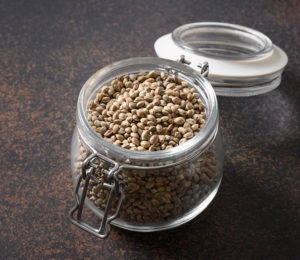Taking Care of your Cannabis Seeds

One of the many benefits of growing your hemp from seed is that – unlike clones – seeds can be stored long term. With a bit of care and attention, hemp seeds can be successfully held over for future planting. The main threats to successful long-term seed storage are: light, temperature, humidity, containers, and
insects/disease. Let’s dive in and look at how you can overcome the challenges each of these represent.
Light
Wherever you plan to store your hemp seeds, it must be completely dark. Any light at all can trigger the seeds into depleting their stored nutrients. Simply put, light will crank up the seeds’ chemical processes. This means you could accidentally start germinating some of your stored seeds before you intend to or
you could end up with weakened seeds that have reduced germination power.
Temperature
Not surprisingly, cool temperatures are ideal for long-term storage. The lower the temp, the greater the likelihood that the seeds will stay dormant and extend their shelf life. That said, you don’t want to go crazy and freeze the little guys. The ideal range is roughly 43 to 47-degrees Fahrenheit, which is (hint,
hint) a typical scope for a refrigerator. But remember what we just said about light? If you use a fridge for storage, you don’t want it to be the family fridge whose door is opened frequently throughout the day, every day. Those frequent door-openings will cause unwanted temperature fluctuations which can be damaging to your storage goals. A small, dedicated storage fridge might be your best answer.
Humidity
Water is life, as they say, and we all know that water is vital to getting seeds to germinate. If your intent is to hold seeds in a dormant (nongerminating) state, even a bit of moisture in the form of humidity could cause you some headaches. Aim for a super-low humidity level between eight and 10 percent for best results. Seeds can last a few months at higher levels (20 to 30 percent) but for longer periods, the drier you can get the environment, the better. If you go over 40 percent, you are starting to run a big risk of germination; over 80 percent will cause the seeds to wither up and die. One handy aid, easily purchased online, is the desiccant silica gel. Packages come in a variety of sizes and are not expensive. Tucking some of these into your storage containers will help draw unwanted moisture out of the
environment and keep your seeds nice and dry. We recommend changing out the desiccant packets every six months or so for maximum effectiveness.
Containers
Glass is the optimal container for seed storage because it is a stable, nonreactive, nonporous material. That’s not to say you can’t use plastic or paper and succeed, it’s just going to be a little riskier and probably suitable only for shorter term storage. Glass is, however, transparent so extra care needs to be taken to make sure that no light hits your glass storage containers. Choose containers that have tight lids and rubber seals to minimize oxygen levels. If you can, vacuum seal. You can even vacuum seal the seeds in a small package and then store that in a larger glass container. It goes without saying (but we’ll say it anyway!) that your containers must be pristinely clean and kept that way throughout the storage interval.
Insects/Disease
Refrigerator storage will help you minimize the risk of an unwanted insect invasion however, there are a couple of additional steps you can take to keep the pests out. One option is to spread a natural insecticide like diatomaceous earth in your storage area. Note that this is NOT a food-safe substance and should not be used in an area that is also used to store any culinary items. Keeping your storage area clean will also discourage pests. When it comes to disease, buying quality seeds from a reputable dealer is your first, best defense. Beyond that the most common disease issue is fungus that can crop up at higher humidity levels. In fact, higher humidity levels also can attract pests. Maintaining low humidity is good protection against insects AND disease.
Some Final Tips
Once you have carefully stored your seeds, your goal should be to maintain those conditions consistently for the storage duration. Variations in the environment can set off biological processes that can ruin your seeds, causing them to germinate prematurely or even rot. The ultimate goal of storage is to give your seeds a nice, long undisturbed sleep so that when you are ready to plant, they are ready to germinate and grow. Oh, and don’t forget to label every container with the strain, date of purchase, and date of storage.
How Long?
Under perfect conditions, stored hemp seed can remain viable for as long as five to ten years. Under decent but less-than-perfect circumstances, your seed can be maintained successfully for a year or two. So … are you ready to give long-term seed storage a try?


Recent Comments